Protein modifications in intestinal disorder
Following their expression, proteins undergo further chemical post-translational modifications that change their structure and hence their properties. One of these processes, prenylation, adds a lipid moiety to the protein and constitutes a key step in the optimal function of a number of proteins. Recent observations support the link between prenylation and regulation of the mucosal immune system in inflammation and cancer. Homeostasis in intestinal mucosa is governed by a complex interaction between intestinal epithelial cells (IECs) and immune cells. In line with these reports, the key objective of the EU-funded 'Influence of protein prenylation and its modulation on the immune system' (PREN-IBD) project was to elucidate the role of prenylation in gut homeostasis and in the development of colorectal cancer. For this purpose, researchers developed transgenic animals that lack the key prenylation enzyme GGTase-Ibeta in T cells and IECs, and studied the physiological consequences of this abrogation. When GGTase-Ibeta was deleted in IECs, mice either died during development or presented with a fatal enteric disease. From a morphological point of view, the intestinal mucosa appeared extremely damaged and the epithelial architecture was destroyed. Mechanistic insight indicated that this was due to signalling dysfunction and cytoskeleton rearrangements. Equally important was the presence of GGTase-Ibeta in T cells. Deletion of this enzyme in T cells caused lymphopenia in mice due to a defected migration of thymocytes to secondary lymphoid organs. To understand the impact of GGTase-Ibeta-deficient T cells in the development of intestinal disorders, scientists induced experimental colitis and cancer in the transgenic mouse model. T cells lacking GGTase-Ibeta expression were shown to be directed to the gut where they exacerbated the severity in colitis, but had a protective anti-tumour response. Collectively, the PREN-IBD study provided fundamental knowledge on the mechanisms governing intestinal homeostasis and underscored the role of prenylation in homeostasis maintenance. These findings will aid the design of novel therapeutic strategies against pathological conditions of the intestine.







